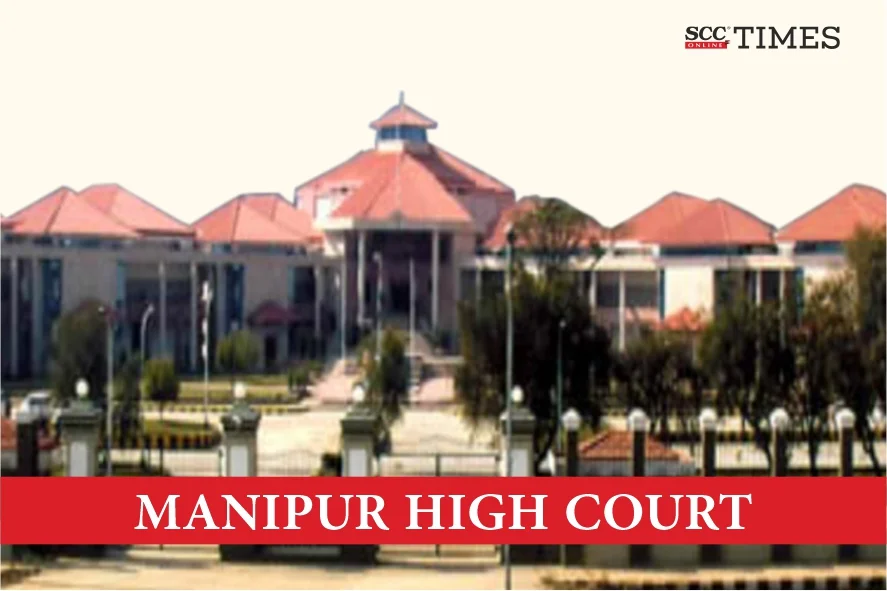Manipur High Court: In a writ petition challenging the gratuity payment order dated 22-11-2017 issued by the Office of the Accountant General (A&E), Manipur ordering for recovering of a sum of Rs. 7,21,073 /- from the gratuity payable to the petitioner allegedly on account of over-payment of pay and allowances to the petitioner, and also praying for issuing direction to the State to refund the deducted amount of Rs. 1,89,889/- to the petitioner within a stipulated period, Ahanthembimol Singh*, J. while quashing the impugned order, directed that the deducted amount must be released to the petitioner within two months from the date of receiving a certified copy of this order.
Background:
In the instant matter, the petitioner was working as an Assistant Sub-Inspector of Police in the Manipur Police Department, a Departmental Enquiry was conducted against him. Based on the enquiry report, the Superintendent of Police(‘SP’)issued an order on 07-01-2010 punishing the petitioner by withholding his increment for three years from the date of suspension. Subsequently, the petitioner retired from service as a Sub-Inspector of Police on 29-02-2016. After retirement, the Office of the Accountant General (A&E), Manipur, issued a gratuity payment order on 22-11-2017, specifying a retirement gratuity of Rs. 1,86,539/-, but also indicating a deduction of Rs. 7,21,073/- due to alleged overpayment of pay and allowances, with a further deduction of Rs. 1,89,889/- from the total gratuity payable.
The Principal Accountant General (A&E), Manipur provided two reasons for issuing the disputed gratuity payment order and deducting Rs. 1,89,889/- from the total gratuity:
-
Upon receiving the petitioner’s pension proposal, irregularities were found in the fixation of his pay. It was noted that upon promotion to the rank of ASI, the petitioner’s pay scale was incorrectly set at Rs. 4,500/- instead of Rs. 4,400/-. Consequently, after pay revision, the petitioner was paid more than entitled, resulting in overpayment.
-
Despite the order from the SP to withhold the petitioner’s increment for three years, the Department released the petitioner’s full pay and allowances without implementing the increment hold. This led to overpayment of pay and allowances to the petitioner.
Analysis and Decision:
The Court said that the key issue requiring attention is whether it is legally acceptable to deduct the purported overpayment of salary and allowances from the retirement benefits owed to the petitioner.
The Court upon reviewing the first reason, did not find evidence supporting the respondent’s claim. Even if the petitioner’s pay was supposed to be Rs. 4,400 in 2005, it would have naturally increased to Rs. 4,500 in 2006 due to yearly increments as per the Revision of Pay Rules, 2010(“ROP Rules”). The document provided by the respondent also confirms the petitioner’s pay as Rs. 4,500 in 2006, which the respondents did not dispute.
The Court said that the petitioner’s pay was correctly set at Rs. 4,500 in 2006, as the evidence suggests, then the argument that the ROP Rules 2010 led to overpayment is baseless. Therefore, there’s no truth to the claim that the petitioner was wrongly paid more than entitled to due to the ROP Rules.
The Court concluded that there was no overpayment due to incorrect fixation of pay, and the deduction made by the respondents from the petitioner’s retirement benefits on this basis is not legally permissible.
The Court referred to Shyam Babu Verma Vs. Union of India [(1994) 2 SCC 521], State of Punjab. Vs. Rafiq Masih (White Washer) [(2015) 4 SCC 334], Syed Abdul Qadir v. State of Bihar [(2009) 3 SCC 475] and Thomas Daniel Vs. State of Kerala [2022 SCC OnLine SC 536] for reviewing the second reason and found merit in favour of the petitioner.
The court said that despite the order issued by the SP imposing a major punishment of withholding the petitioner’s increment for three years from the date of his suspension, the department released his full pay and allowances without withholding any increment. Thus, this resulted in overpayment to the petitioner.
The Court said that the authorities should not be allowed to recover any excess amount already received from the petitioner’s retirement benefits, especially after the petitioner’s retirement.
The Court remarked that the retirement benefits are hard-earned, not gifts. Though the petitioner consented to deductions, this doesn’t excuse unjust actions by authorities. Nearing retirement, employees may feel pressured to consent for quicker processing. Consent doesn’t justify arbitrary actions.
The Court said that not mentioning the Consent Certificate doesn’t constitute concealment of facts.
The Court after=considering the facts, circumstances, discussions, and catena of decisions, held that the respondent’s order to deduct Rs. 1,89,889 from the petitioner’s retirement gratuity was illegal and unsustainable.
Thus, the Court quashed the impugned order. and directed that the deducted amount must be released to the petitioner within two months from the date of receiving a certified copy of this order.
[K. Yangla v. State of Manipur., 2024 SCC OnLine Mani 134, decided on 24-04-2024]
Advocates who appeared in this case:
Counsel of Petitioner: Senior Advocate Kh. Taunkumar, Advocate Jemon
Counsel of Respondents: GA Niranjan Sanasam, Advocate S.Suresh






